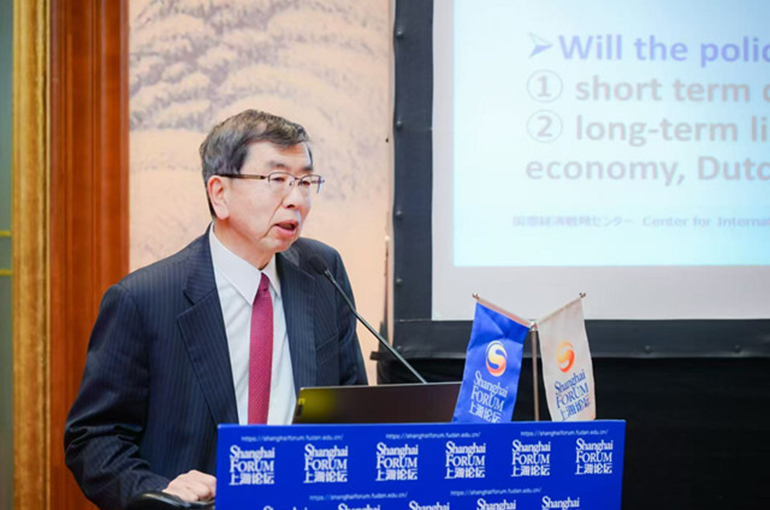 Trump’s Tariff Policy Is a 'Totally Misguided Idea,' ADB's Ex-Head Says
Trump’s Tariff Policy Is a 'Totally Misguided Idea,' ADB's Ex-Head Says(Yicai) May 7 -- US President Donald Trump's tariff policy is a "totally misguided idea," according to Takehiko Nakao, who served as president of the Asian Development Bank between 2013 and 2020.
"Trump's policy is a totally misguided idea," Nakao told Yicai in an interview. "It's as if we're going back to the period of mercantilism."
Nakao, who also previously served as Japan's vice minister of finance for international affairs, criticized the simplistic logic behind Trump's tariff calculations, which he said disproportionately penalize smaller trading partners.
Nakao gave the example of a small African country that exports diamonds to the United States but imports nothing from the US. According to Trump's formula, the tariff on the country would be half of the trade deficit divided by US imports, which is half of 100 percent, or 50 percent.
At the core of Trump's policy is a misunderstanding of the US economic structure, Nakao said. "Although Trump claims America has been exploited and taken advantage of by other countries, in reality, it is very strong and is gaining huge income from service trades,” he noted.
The US has a robust services sector, which includes consultancies, financial services providers, and technology giants like Microsoft, Nakao pointed out. In international trade, the US’ strengths mainly lie in resources such as oil and natural gas.
Moreover, the US' capital account surplus -- where more foreign money flows in than the other way around -- is a sign of economic strength rather than weakness, he added.
"America has a current account deficit because there is a capital account surplus," Nakao explained. "It is because the US dollar is a key currency, and many countries and private sectors want to maintain foreign reserves in US dollars by buying American treasury bonds."
Economic Consequences
The immediate impact of Trump's tariff policy has already begun to materialize, according to Nakao. "The short-term impact is financial confusion, inflation, and production slowdown,” he said.
Financial markets have reacted with volatility, with the US dollar strengthening and bond yields rising. "The dollar isn't cheap, and American bonds are cheaper, which means interest rates are higher," Nakao said. "This is bad for business and consumers, for mortgages, and stock prices."
For consumers and retailers, the effects could be severe. "If tariffs on China reach 25 percent, trade becomes almost impossible," he warned.
Major retailers such as Walmart and tech companies like Apple will be impacted significantly by Trump's tariffs. "Walmart buys many things like toys and other products from China, and they'll suffer," he noted. "Apple and smartphone makers who import final products and parts from China will also suffer."
Unlikely Reshoring
"Trump says we should endure this for some time to make manufacturing return to America, but it takes time, and it wouldn't happen even in the longer term,” according to Nakao. "Manufacturing is only less than 10 percent of [US] gross domestic product and less than 10 percent of employment."
Global supply chains have developed based on economic rationality, with nations specializing in areas where they have comparative advantages. "Some countries have better workers or more workers, others have resources," Nakao noted. "It's very difficult to change these economic fundamentals."
Even if companies wanted to relocate manufacturing to the US, practical challenges would emerge. "Without predictability, they cannot make massive investments in America because, in four years, policies could change completely," Nakao pointed out. "Additionally, there's a shortage of workers."
Rather than imposing tariffs, Nakao suggested the US focus on looking after workers affected by economic changes. "America should take care of struggling factory workers and miners by supporting retraining and transitioning to growing industries, instead of blaming others,” he said.
Nakao believes the US’ domestic policy choices are a bigger factor in economic inequality than trade. "America is the only one among advanced countries that doesn't have universal health coverage," he said. "Americans should collect more money from wealthy people through taxation and distribute support to ordinary people."
Global Implications
When asked if these policies could trigger a global economic crisis, Nakao was cautious but concerned. "Economic growth will be reduced, that's for sure," he noted. "But whether it would cause a crisis like the Lehman crisis or the Asian financial crisis, I don't know."
For Asian countries, Nakao recommended maintaining open trade among themselves while continuing dialogue with the US. "China, Japan, and [South] Korea can maintain free trade among themselves and open markets even further," he said. "And regional cooperation can be enhanced with European countries, Australia, and so on."
However, Nakao warned about confrontational approaches. "If it's perceived as ganging up together to fight America, it's not productive," he said. “It's better to be friendly and moderate.”